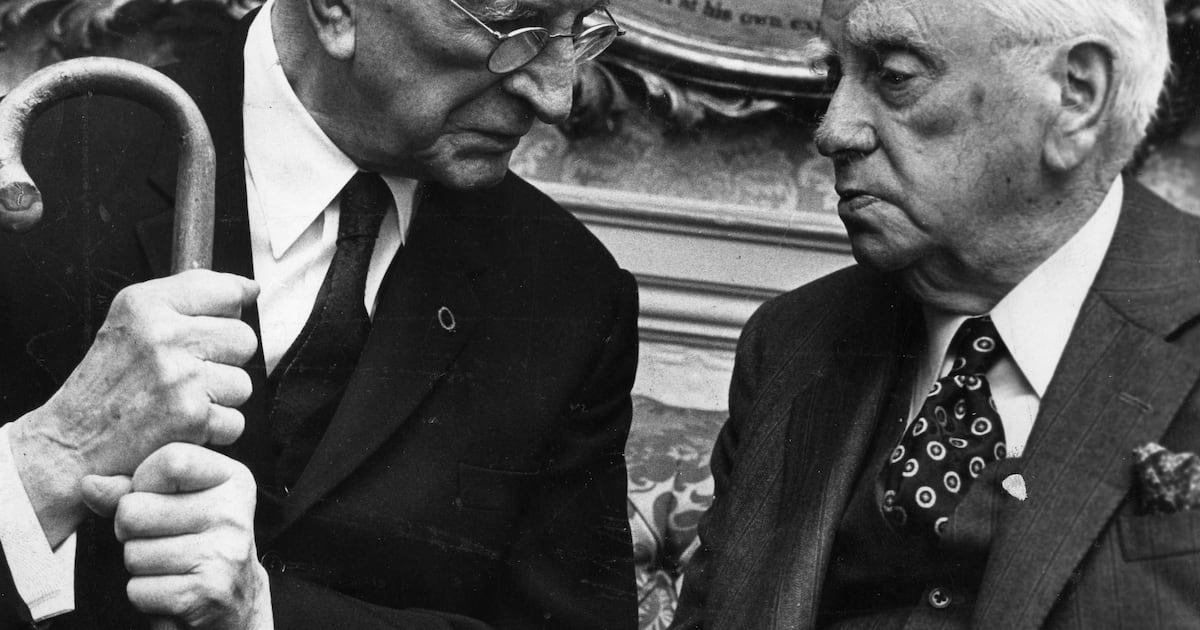Top Stories
New Book Unveils Untold Truths of Anglo-Irish Treaty’s Demise

UPDATE: A groundbreaking new book by historian David McCullagh sheds light on the intricate and often overlooked events surrounding the Anglo-Irish Treaty, which ultimately led to the Irish Civil War. This urgent analysis comes as Ireland commemorates its independence struggle and the complex history that shaped the nation.
Historians have uncovered a wealth of new perspectives on the Treaty, revealing layers of complexity previously absent from mainstream narratives. The work, part of the Trinity College Dublin project titled “Witnessing War, Making Peace,” emphasizes a more nuanced understanding of the social and political dynamics at play during this fraught period.
The book meticulously details how the Treaty, signed in 1921, was not merely a document but a catalyst for decades of tension in Ireland. McCullagh’s research highlights the profound impact of sectarianism and how the Partition of Ireland in 1920 exacerbated divisions within the new state.
McCullagh argues that the Treaty’s inclusion of an oath of allegiance to the Crown was a contentious point that symbolized the lack of full sovereignty for the newly formed Irish Free State. Under the leadership of Cumann na nGaedheal, efforts were made to assert Ireland’s sovereignty while navigating the complex relationship with Britain.
As political tensions escalated, the election of Éamon de Valera and Fianna Fáil in 1932 shifted the narrative dramatically. McCullagh reveals how de Valera’s government moved swiftly to dismantle significant elements of the Treaty, including the controversial oath, marking a critical turning point in Irish history.
By 1938, the British government found itself in a precarious position, conceding to many of de Valera’s demands, which included the abolition of the oath and the return of Treaty naval ports. This period, characterized by a push for full autonomy, ultimately culminated in the formal declaration of a republic in 1949.
McCullagh emphasizes that Ireland grappled with its identity during this transformative era. The nuances of these historical events are crucial, as they shape current discussions about national identity and unity, particularly in light of ongoing relations with Northern Ireland.
The book has already sparked significant interest among scholars and the public alike, prompting renewed debates on the legacy of the Treaty and its lasting implications. McCullagh’s extensive research is seen as a vital contribution to understanding this pivotal chapter in Irish history.
As the anniversary of the Treaty approaches, McCullagh’s findings urge contemporary readers to reflect on the complexities of national identity, sovereignty, and the historical narratives that continue to influence Ireland today. The book promises to engage a wide readership, fostering important discussions about the past and its relevance in the present.
Expect further developments as historians and political analysts continue to dissect the implications of McCullagh’s work, urging Ireland to confront its past with a critical eye. The conversation around the Anglo-Irish Treaty is far from over, and this new scholarship is set to be a significant part of that dialogue.
-

 Top Stories2 months ago
Top Stories2 months agoTributes Surge for 9-Year-Old Leon Briody After Cancer Battle
-

 Entertainment3 months ago
Entertainment3 months agoAimee Osbourne Joins Family for Emotional Tribute to Ozzy
-

 Politics3 months ago
Politics3 months agoDanny Healy-Rae Considers Complaint After Altercation with Garda
-

 Top Stories3 months ago
Top Stories3 months agoIreland Enjoys Summer Heat as Hurricane Erin Approaches Atlantic
-

 World4 months ago
World4 months agoHawaii Commemorates 80 Years Since Hiroshima Bombing with Ceremony
-

 Top Stories4 months ago
Top Stories4 months agoFianna Fáil TDs Urgently Consider Maire Geoghegan-Quinn for Presidency
-

 Top Stories2 months ago
Top Stories2 months agoNewcastle West Woman Patricia Foley Found Safe After Urgent Search
-

 World4 months ago
World4 months agoGaza Aid Distribution Tragedy: 20 Killed Amid Ongoing Violence
-

 World4 months ago
World4 months agoCouple Convicted of Murdering Two-Year-Old Grandson in Wales
-

 Top Stories3 months ago
Top Stories3 months agoClimbing Errigal: A Must-Do Summer Adventure in Donegal
-

 Top Stories3 months ago
Top Stories3 months agoHike Donegal’s Errigal Mountain NOW for Unforgettable Summer Views
-

 World4 months ago
World4 months agoAristocrat Constance Marten and Partner Convicted of Infant Murder









